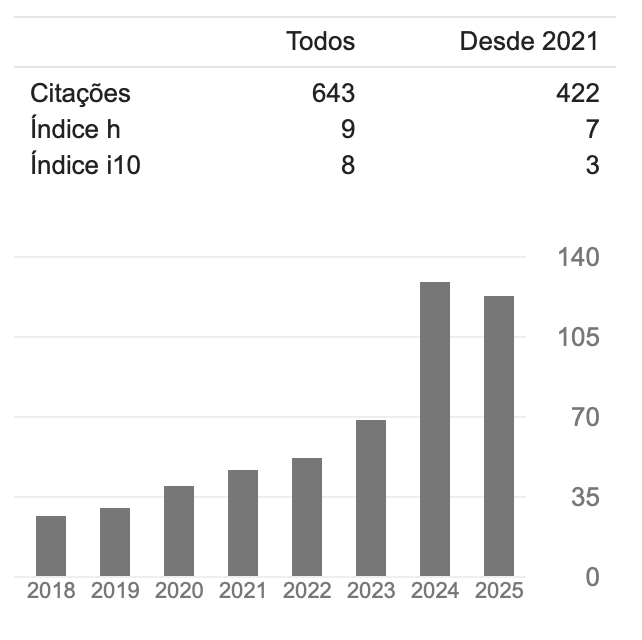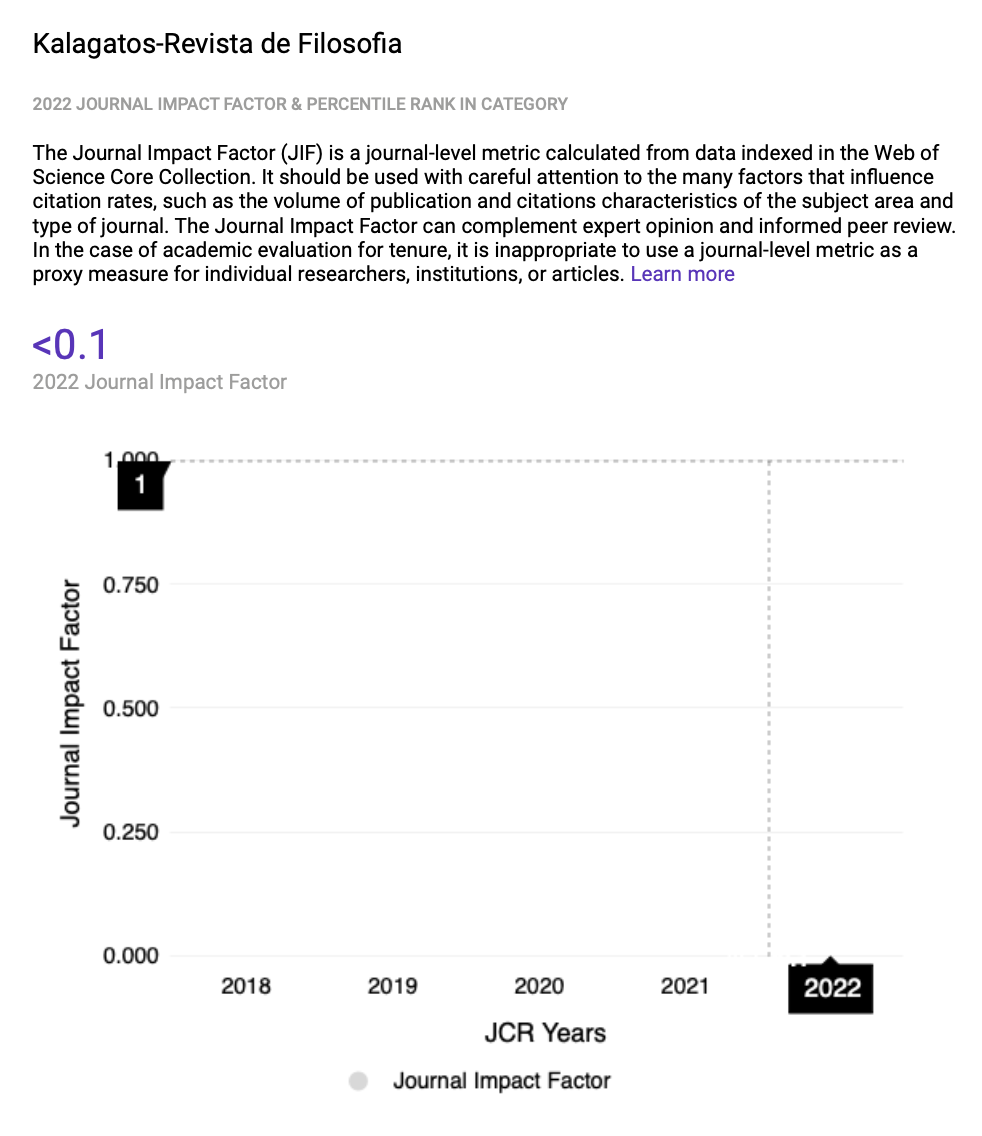About the Journal

Kalagatos - Philosophical Journal (Qualis A3) is a scientific journal created and edited by the Postgraduate Program in Philosophy at the State University of Ceará - PPGFIL-UECE, aimed at publishing articles by doctoral students and doctors in Philosophy.
State University of Ceará - UECE
Humanities Center – CH
Postgraduate Program in Philosophy - PPGFil
Kalagatos - Philosophical Journal
E-ISSN: 1984-9206 / ISSN: 1808-107X
Qualis: A3
Focus and Scope
The Kalagatos de Filosofia Magazine is a space dedicated to the wide diversity of philosophical thought, seeking to promote dialogues and in-depth reflections on the most varied themes and philosophical currents. Our goal is to encourage academic debate, offering a meeting place for students, researchers and lovers of philosophy.
Focus:
The magazine focuses on articles, essays and reviews that address fundamental questions of human existence, ethics, politics, aesthetics, epistemology, metaphysics and all areas of philosophical knowledge. We encourage the submission of works that explore new perspectives, original investigations and creative reinterpretations of classic and contemporary thinkers.
Scope:
Contemporary Philosophy: Analysis of contemporary thinkers, current philosophical debates and their social and cultural implications; History of Philosophy: Critical studies on classical philosophers and their contributions to human thought; Ethics and Morals: Discussions about morality, justice, human rights, social responsibility and ethical theories; Politics and Society: Reflections on power, democracy, governance, social justice, multiculturalism and political theory; Aesthetics and Culture: Explorations on art, beauty, cultural criticism, literature, cinema and the interactions between aesthetics and society; Epistemology and Philosophy of Science: Analysis of knowledge, scientific method, truth, skepticism and philosophy of mind; Metaphysics and Ontology: Investigations into the nature of reality, being, existence and questions about the universe and its structure.
Declaration of Ethics and Good Practices
The Kalagatos - Revista de Filosofia Ethics and Good Practices Manual regulates the journal's editorial policy, the conduct of authors and editors, as well as all collaborators. Therefore, we declare:
A) OBJECTIVE
1) Kalagatos is a scientific magazine, with philosophical content, edited and maintained by the Postgraduate Program in Philosophy at the State University of Ceará - PPGFil-UECE. The main objective of this journal is to create a channel for disseminating high-level philosophical research, as well as establishing an exchange between researchers from different institutions around the world.
2) Kalagatos receives original articles, fruits of philosophical research, reviews of books published up to two years prior to the date of submission and translations of texts, with written authorization from the author or responsible editor.
B) TARGET AUDIENCE
1) Kalagatos' main audience is researchers from any area of Philosophy. The book access policy, however, expands the audience to interested students from different areas and the curious.
C) RESPONSIBILITIES OF THE EDITORIAL BODY
1) The top management of Revista Kalagatos is the Board of the Postgraduate Program in Philosophy at the State University of Ceará - PPGFil-UECE. It is the responsibility of this collegiate to decide on the editors and advisors.
2) The Editorial Board is the body responsible for Kalagatos' editorial policy. The Editorial Board is made up of up to 5 professors, from any institution, nominated by the PPGFil-UECE board, in addition to the Scientific Editor and the Executive Editor.
3) Scientific Editor is responsible for extraordinary decisions on editorial policy, in cases omitted by the Editorial Board. The Scientific Editor is responsible for distributing the articles received to reviewers.
4) Executive Editor is technically responsible for the maintenance, periodicity and daily administration of Kalagatos, as well as for the execution of the editorial policy decided by the Board and the Scientific Editor. The Scientific Editor is responsible for distributing the articles received to reviewers.
5) Editorial Assistant is responsible for the technical support provided to the Executive Editor.
6) Scientific Council is made up of professors with doctorates, with renowned knowledge in specific areas of Philosophy, invited by the Editorial Board. It is the responsibility of the Scientific Council to provide an opinion, when requested, on articles, reviews, translations and dossier projects. The Scientific Council is responsible for establishing Kalagatos' philosophical-methodological guidelines.
7) Permanent Review Committee is made up of professors with doctorates, with renowned knowledge in specific areas of philosophy, invited by the Editorial Board. The Permanent Reviewer is responsible for providing an opinion, when requested, on articles, reviews, translations and draft dossiers. The Review Committee, in addition, is responsible for permanently observing the progress of Kalagatos, preparing critical analyzes when deemed necessary.
8) An ad hoc reviewer is a doctoral professor, with renowned knowledge in specific areas of philosophy, who is invited to evaluate articles, reviews, translations and dossier projects in two specific cases: a) when there is none, among the members of the Scientific Council , no specialist in the area of the manuscript; b) when there is no availability of any of the members of the Scientific Council.
D) PERIODICITY
1) Kalagatos is published every six months, in the months of January and July. Thus, the periodicity of Kalagatos is recorded as follows: each volume corresponds to a year of uninterrupted periodicity and each number corresponds, ordinally, to the sequence of editions published in that year.
E) SECTION POLICY
1) Kalagatos is made up of 7 sections: a) Articles; b) Translations; c) Reviews; d) Errata; e) Dossier; f) Presentation; g) Editorial; h) Interviews.
2) In the articles section, unpublished articles will be published, the result of scientific research, which will go through a prior filter, by the editors, which checks whether the article meets the formal requirements established for all publications. Once this process has been completed, if no problems are found, the work will go through the peer review process, using the double-blind method. In cases of contrasting opinions, a third evaluator will be mobilized, without knowledge of the previous opinions, to produce the final opinion.
The referees will evaluate the article taking into account the following criteria: a) relevance of the discussion in relation to the state of the art; b) argumentative coherence in relation to the reference presented; c) the relevance of the reference presented for the proposed topic; d) originality of the article; e) clarity and argumentative coherence; and f) Textual cohesion and coherence. Articles can be up to 20 pages long (exceptions are decided by the scientific editor).
3) The translations section welcomes texts translated from any language, with the presentation of a letter of authorization from the author or editor of the original text. In these cases, the edition of the original text must be indicated. Translations of translations will not be accepted, except in cases resolved by the Scientific Editor. The translation evaluation process involves peer review, using the single-blind method. The translation evaluation criteria are: a) quality of the translation; b) originality of the translation; c) relevance of explanatory notes; and d) textual cohesion and coherence. Translations of less than 5 pages will not be accepted (exceptions are decided by the scientific editor).
4) The reviews section welcomes reviews of books published in the last two years, in any language. The review evaluation process involves peer review, using the single-blind method. When analyzing the review, the following are taken into account: a) coherence of the argument in relation to the work reviewed; b) clear presentation of the book’s ideas; and c) textual cohesion and coherence. Reviews must be a minimum of 5 pages and a maximum of 10 (exceptions are decided by the scientific editor).
5) The errata section publishes rectifications of information, text amendments, language corrections, necessary clarifications and information that was omitted. Any author or member of the Kalagatos Editorial Board can request an errata. Readers who wish to indicate corrections should contact the Executive Editor. The analysis of what should be published goes through peer review, using the blind method (no-blind). The criterion for accepting an errata is the need to correct the original text. Controversies are not published in this section.
6) The Dossiers Section has the same policy as the Articles Section. It should be added, however, that this is a thematic issue of Kalagatos, created by a member of the editorial board at least 1 year in advance. The dossier project is submitted for the opinion of a specialist who must evaluate the viability, relevance and pertinence of the thematic dossier.
7) The presentation is the responsibility of the Executive Editor, with the aim of introducing the reader to events with editorial importance and the texts of the published issue.
8) The Editorial is the responsibility of the Editorial Board and presents the opinion of that board on various and relevant subjects.
9) Interviews can be submitted by any interested party and will be evaluated exclusively by the Editorial Board, being analyzed according to the magazine's editorial interest and relevance.
F) ABOUT CONFLICT OF INTEREST
1) The Kalagatos Magazine Editorial Committee considers anything that may interfere with the results presented in the article, peer review or editorial decisions to be a conflict of interest. The source of the conflict of interest can be personal, financial, professional or institutional. Therefore, Kalagatos requires its collaborators, authors, evaluators, advisors and editors to expressly declare their conflict of interest.
2) Failure to declare a conflict of interest results in the rejection of publication proposals and the exclusion of the advisor or editor from Kalagatos staff. If the conflict of interest is only known after publication, Kalagatos will publish a note informing readers of the conflict of interest identified in the following edition.
3) Kalagatos - Revista de Filosofia requires that all conflicts of interest be declared in a note to the Editor, when submitting the manuscript.
4) The following are financial conflicts: a) sources of research funding; b) paid consultancies; c) financial gains from publishing the manuscript; d) corporate participation of companies or organizations that may be privileged with the publication of the manuscript; e) research grants; f) daily allowances, subsidies or fees in relation to the research process that generated the manuscript; g) benefits arising from the research and publication of the article.
5) The following are non-financial conflicts: a) political, party or electoral interests; b) participation in advisory boards that may be favored by the publication of the manuscript; c) relationship, of any kind, with financing organizations, governmental or not; d) personal relationships (friend, spouse, family member, advisor, student) of any member of the Scientific Council or editorial board of Kalagatos;
6) The authors, based on what has been said, must declare: a) Names of the development and financing institutions; b) describe the role of the funder in the research process; c) any personal or professional relationship with the members of the Kalagatos editorial board; d) if they participate in any organization or entity that benefits from the publication of the article; e) if they belong to the editorial board or scientific council of Kalagatos.
7) Kalagatos editors, advisors and reviewers must declare their interests, if they benefit from the acceptance and publication of the manuscript. In this case, they must refrain from any relationship with the job evaluation process. In this case, the editor will only participate in the technical process, without any involvement in the editorial decision to publish the work.
8) The following are cases where a reviewer is prevented from doing so: a) working or having worked in the last 5 years at the same institution as the author; b) have collaborated with or provided consultancy to the author; c) have published with the author in the last 5 years; d) have personal relationships with the author; e) having been the author’s advisor or advisor.
G) COPYRIGHT
1) Authors maintain copyright and grant the magazine the right of first publication, with the work simultaneously licensed under the Creative Commons Attribution License which allows sharing of the work with acknowledgment of authorship and initial publication in this magazine.
2) Authors are authorized to enter into additional contracts separately, for non-exclusive distribution of the version of the work published in this journal (e.g., publishing in an institutional repository or as a book chapter), with recognition of authorship and initial publication in this journal.
3) Authors are permitted and encouraged to publish and distribute their work online (e.g. in institutional repositories or on their personal page) at any point before or during the editorial process, as this can generate productive changes as well as increase the impact and citation of published work (See The Effect of Open Access).
H) PRIVACY POLICY
1) The names and addresses provided in this magazine will be used exclusively for the services provided by this publication, and will not be made available for other purposes or to third parties.
2) The author's email will be disclosed together with the publication of the manuscript, except in cases where the author expresses his/her contrary intention.
3) The result of the opinion given to the submitted work is confidential. Only the author and editors will have access.
I) FREE ACCESS POLICY
1) This magazine offers immediate free access to its content, following the principle that making scientific knowledge freely available to the public provides greater global democratization of knowledge.
J) PLAGIARISM
1) Plagiarism is a violation of good practices and research ethics, in addition to being classified as a crime in several laws around the world.
2) Kalagatos does not tolerate any type of plagiarism: a) full or exact plagiarism, when the entire text is copied, as it appears in the original source (even if translated); b) partial plagiarism, with or without the practice of mosaic, when you copy only part of a text, whether or not it is added to other copied texts; c) self-plagiarism, when copying the author's own texts, already published, presenting them as original; d) Conceptual plagiarism, characterized when an authorial idea is explicitly copied without due reference.
3) Kalagatos uses plagiarism screening tools in a systematic and sample way. Searches on Google, Plagium.com, docxweb.net, among others, are used to detect possible crimes against copyright.
4) Texts with plagiarism are summarily rejected from the Kalagatos editorial queue. If plagiarism is detected after publication, it will be removed from the air and the case will be forwarded to the legal sector of the State University of Ceará.
5) Reports of plagiarism in Kalagatos articles can be sent to the editor: kalagatos@uece.br
K) ETHICS AND RESEARCH
1) Kalagatos does not publish research with human beings.
2) No article published in Kalagatos can directly violate the legislation in force in Brazil and Human Rights. Controversy, however, is the researcher’s inalienable right.
3) The opinion expressed in articles published in Kalagatos does not necessarily agree with the opinion of the editors. In this sense, we are not responsible for the opinions expressed, however, we unrestrictedly support freedom of expression and thought.
4) Kalagatos has an editorial team with its own opinions, expressed in its editorials, which do not necessarily reflect the opinion of its collaborators.


















